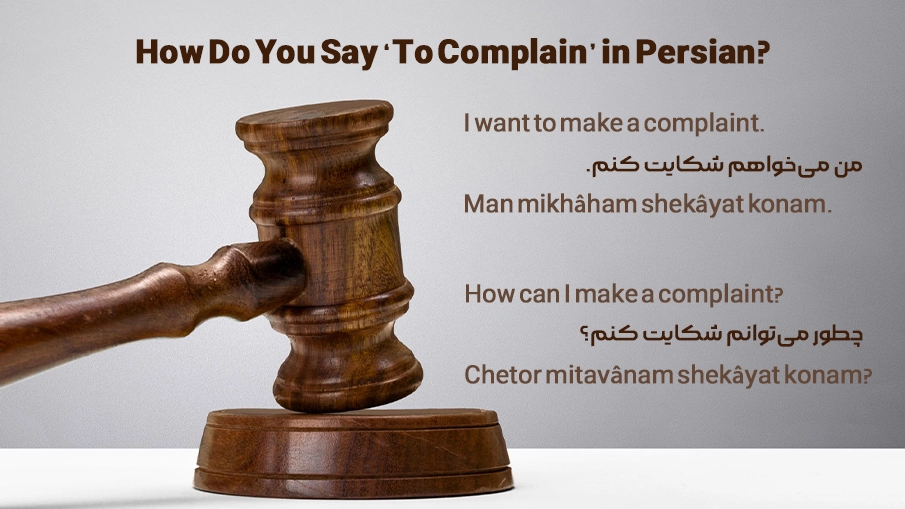When traveling to Persian-speaking countries or interacting with Persian speakers, knowing how to articulate complaints politely and effectively is an essential skill. Persian, also known as Farsi, is a rich and expressive language with unique idiomatic phrases tailored for various situations, including Making Complaints in Persian. Understanding these phrases not only boosts your language skills but also ensures smoother communication in frustrating moments.
Whether you’re addressing an issue at a hotel, restaurant, or workplace, this guide will provide you with key vocabulary, phrases, and cultural tips to help you express yourself confidently in Persian.
How Do You Say ‘To Complain’ in Persian?
The verb “to complain” in Persian is expressed as شکایت کردن (shekâyat kardan). It is a combination of the noun شکایت (shekâyat), meaning “complaint,” and the auxiliary verb کردن (kardan), meaning “to do.” Together, they form the phrase “to make a complaint.”
Here are some ways to use this in sentences:
-
- من میخواهم شکایت کنم. (Man mikhâham shekâyat konam.) – I want to make a complaint.
-
- چطور میتوانم شکایت کنم؟ (Chetor mitavânam shekâyat konam?) – How can I make a complaint?
How to Say ‘The Complaint’ in Persian

The word “complaint” is شکایت (shekâyat). Here’s how to use it effectively:
-
- این شکایت خیلی جدی است. (In shekâyat kheili jeddi ast.) – This complaint is very serious.
-
- لطفاً شکایت مرا بررسی کنید. (Lotfan shekâyat-e marâ barresi konid.) – Please review my complaint.
Knowing how to combine this word with appropriate verbs and expressions is crucial for fluency.
Making Complaints in Persian Words and Phrases
Here are essential words and phrases to help you navigate situations where a complaint is necessary:
Key Words for Complaints
| English | Persian | Pronunciation |
| Complaint | شکایت | Shekâyat |
| Problem | مشکل | Moshkel |
| Mistake | اشتباه | Eshtebâh |
| Manager | مدیر | Modir |
| Responsible Person | مسئول | Mas’ool |
| Customer Service | خدمات مشتری | Khedmat-e Moshtari |
Common Phrases for Complaints
- I have a complaint.
-
- من شکایتی دارم. (Man shekâyati dâram.)
- This is unacceptable.
-
- این غیرقابل قبول است. (In gheir-ghâbel-e ghabool ast.)
- Can I speak to the manager?
-
- میتوانم با مدیر صحبت کنم؟ (Mitavânam bâ modir sohbat konam?)
- There is a problem with my order.
-
- با سفارش من مشکلی وجود دارد. (Bâ sefâresh-e man moshkeli vojud dârad.)
- I am not satisfied.
-
- من راضی نیستم. (Man râzi nistam.)
- Please fix this issue.
-
- لطفاً این مشکل را حل کنید. (Lotfan in moshkel râ hal konid.)
Making Complaints in Persian Translation
Translating common English complaints into Persian helps you get a sense of how the language works. Below are some examples:
| English Complaint | Persian Translation | Pronunciation |
| This food is cold. | این غذا سرد است. | In ghazâ sard ast. |
| The service was slow. | خدمات خیلی کند بود. | Khedmât kheili kond bood. |
| I received the wrong item. | آیتم اشتباهی دریافت کردم. | Item eshtebâhi daryâft kardam. |
| There is a mistake in the bill. | در صورتحساب اشتباهی وجود دارد. | Dar soorat-hesâb eshtebâhi vojud dârad. |
Making Complaints in Persian Language
Learning how to complain in Persian isn’t just about words—it’s about understanding cultural nuances of Iran. Persian-speaking cultures highly value politeness, even in complaints. Starting with a respectful tone often helps resolve issues faster.
Cultural Tips for Complaints
-
- Always greet the person before lodging a complaint:
-
- سلام، وقت بخیر! (Salâm, vaght bekheir!) – Hello, good day!
-
- Always greet the person before lodging a complaint:
-
- Use respectful forms of address, such as:
-
- آقا (Âghâ) for men or خانم (Khânom) for women.
-
- Use respectful forms of address, such as:
-
- Avoid raising your voice; instead, emphasize your dissatisfaction calmly.
Making Complaints in Persian Phrases
Here are some polite and assertive phrases you can use to make complaints in Persian:
-
- There seems to be a misunderstanding.
-
- به نظر میرسد یک سوءتفاهم وجود دارد. (Be nazar miresad yek so’etafâhom vojud dârad.)
-
- There seems to be a misunderstanding.
-
- I expected better service.
-
- انتظار خدمات بهتری داشتم. (Entezâr khedmat-e behtari dâshtam.)
-
- I expected better service.
-
- Can you resolve this immediately?
-
- میتوانید این را فوراً حل کنید؟ (Mitavânid in râ forân hal konid?)
-
- Can you resolve this immediately?
-
- This needs urgent attention.
-
- این نیاز به توجه فوری دارد. (In niyâz be tavajjoh-e fori dârad.)
-
- This needs urgent attention.
Learn Farsi with Danaa School
If you’re serious about learning Farsi, platforms like Danaa School can help you master conversational skills, including making complaints effectively. Their structured lessons provide real-life scenarios to enhance your vocabulary and boost confidence.
Why Choose Danaa School?
-
- Comprehensive lessons on essential topics like complaints.
-
- Cultural insights to ensure you sound natural and respectful.
-
- Practice with native speakers for real-world fluency.
Find Your Ideal Teacher
At Danaa School, you can choose your Farsi tutor from a selection of qualified and experienced teachers. Begin an exceptional journey into the world of Persian language!
Book Your Trial Lesson
FAQs
What is the Persian word for a complaint?
The word for “complaint” in Persian is شکایت (shekâyat).
How do you say ‘I want to make a complaint’ in Persian?
You can say من میخواهم شکایت کنم. (Man mikhâham shekâyat konam.).
What’s the polite way to complain in Persian?
Begin with a greeting, use respectful titles like آقا or خانم, and phrase your complaint calmly.
How important is tone in Persian complaints?
Tone is crucial in Persian culture; being polite often yields better results than being aggressive.
Are there idiomatic expressions for complaining in Persian?
Yes, one common phrase is حرف دلم را میزنم (Harf-e delam râ mizanam), meaning “I’m speaking my mind.”
Can I practice complaints with native speakers?
Yes, joining language exchange programs or platforms like Danaa School is an excellent way to practice.
Conclusion
Mastering how to make complaints in Persian goes beyond learning words—it’s about grasping the nuances of language and culture. With phrases like من شکایتی دارم (Man shekâyati dâram) and tools like Danaa School, you can navigate challenging situations gracefully. Complaints, when expressed politely, often lead to swift resolutions and demonstrate cultural respect.
For further practice, immerse yourself in real-life scenarios, and don’t hesitate to experiment with your new skills. Persian fluency is a journey, and every step counts! Enroll now.
Want to Learn Farsi at Danaa School?
Here are the best resources for you!









